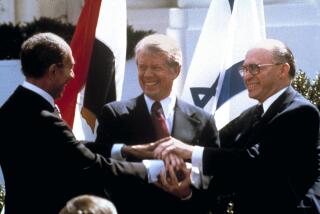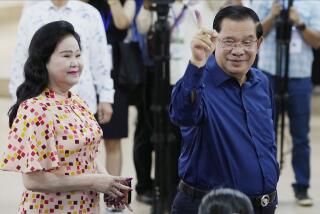A Fragile Truce Is Perilously Flexed : Khmer Rouge treachery brings U.N. sanctions
- Share via
In the long effort to bring peace to Cambodia, the Khmer Rouge has always been the wild card. Now the Maoist party, whose murderous reign from 1975 to 1979 turned the Cambodian landscape into killing fields, is playing its hand to disrupt the fragile truce being overseen by the United Nations. The Khmer Rouge has refused to disarm, breaking a promise it made in signing the 1991 Paris peace accords.
This disgraceful reneging prompted the U.N. Security Council to take new initiatives on Monday. The Khmer Rouge must not be allowed to sabotage the international bid to hold free parliamentary elections next May. Much is at stake--not just democracy in Cambodia but the world image of U.N. peacekeeping operations; in Cambodia, the United Nations has mounted one of its most ambitious efforts ever, involving 16,000 troops, 2,000 civilian employees and expenditure of $2 billion.
Despite its murderous past, the Khmer Rouge was embraced as a necessary and unavoidable party to peace talks among the four warring Cambodian factions. To exclude the guerrilla group surely would have extended the civil war.
By signing the Paris accords, the Khmer Rouge committed to a democratization plan and a popular election. Now, in refusing to disarm, the rebels further discredit themselves and dispel whatever hope remains that they can stand for anything but more violence.
The Security Council--with China, which once backed the Khmer Rouge, abstaining--on Monday imposed economic sanctions to pressure the Khmer Rouge to rejoin the peace process. The U.N. resolution asks nations to stop buying lumber from and supplying oil to Khmer Rouge-controlled areas.
The Security Council also said that parliamentary elections will be held with or without the Khmer Rouge in May.
In addition, the United Nations is now organizing a separate election for a president, in which Prince Norodom Sihanouk appears to be a shoo-in as the head of state.
The French want the presidential election before May. But Britain and the United States--concerned about the mercurial prince and the possibility that the Phnom Penh government might postpone the May vote if Sihanouk is elected--favor holding the presidential and parliamentary elections simultaneously, which makes more sense.
Elections in Cambodia are even more crucial now because of--and despite--the Khmer Rouge. Whatever its reputation, its actual numbers and influence may be less than believed.
With the approach of the dry season in January, traditionally a time when military offenses begin, the Khmer Rouge may be plotting violence to get its way. That must not be allowed to happen again--now or ever.
More to Read
Sign up for Essential California
The most important California stories and recommendations in your inbox every morning.
You may occasionally receive promotional content from the Los Angeles Times.










